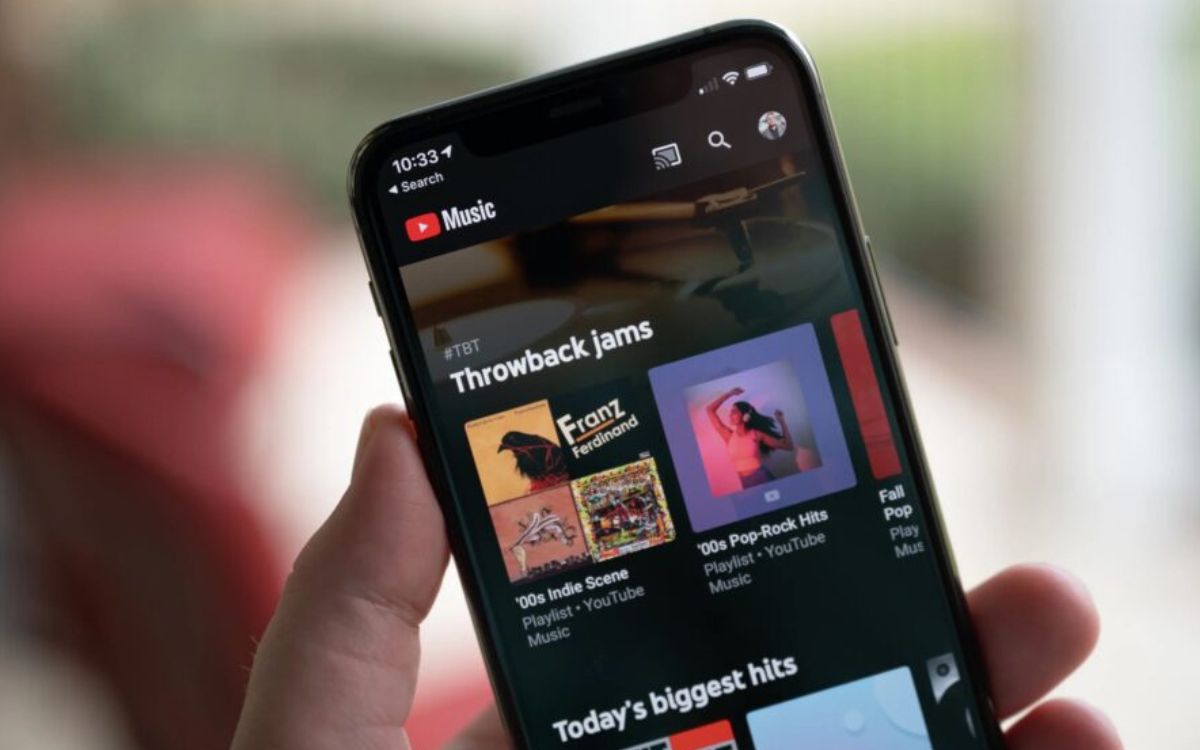Home>Events & Info>Podcast>How To Start A Podcast To Make Money


Podcast
How To Start A Podcast To Make Money
Modified: February 17, 2024
Learn how to start a podcast and monetize your passion for podcasting. Generate income by creating engaging content with our step-by-step guide.
(Many of the links in this article redirect to a specific reviewed product. Your purchase of these products through affiliate links helps to generate commission for AudioLover.com, at no extra cost. Learn more)
Table of Contents
- Introduction
- Choosing a Topic for Your Podcast
- Planning and Preparing Your Podcast
- Selecting the Right Equipment
- Recording and Editing Your Podcast
- Creating Engaging Content
- Promoting Your Podcast
- Monetizing Your Podcast
- Generating Revenue through Sponsorships
- Exploring Other Money-Making Opportunities
- Conclusion
Introduction
Podcasting has become an incredibly popular form of media in recent years, providing a unique platform for individuals to share their thoughts, stories, and expertise with a global audience. Not only is podcasting a powerful tool for self-expression, but it can also be a lucrative endeavor for those looking to make money in the digital space.
With the right topic, engaging content, and effective promotion, starting a podcast can lead to various monetization opportunities. Whether you’re a seasoned content creator or new to the world of podcasting, this comprehensive guide will walk you through the essential steps to launch a successful podcast and turn it into a profitable venture.
But before we delve into the nitty-gritty of podcasting for profit, it’s important to understand that building a successful podcast takes time, effort, and dedication. While the road to monetization may not be immediate, by following the steps outlined in this guide and utilizing various revenue streams, you can pave the way to financial success.
In the next sections, we’ll cover everything you need to know, from choosing the right topic and planning your podcast to recording and editing, creating engaging content, promoting your show, and finally, monetizing your podcast through sponsorships and other income-generating opportunities.
So whether you’re a passionate storyteller, an industry expert, or simply have a unique perspective to share, let’s dive in and explore how you can start a podcast and make money doing what you love.
Choosing a Topic for Your Podcast
When starting a podcast, one of the first and most important decisions you’ll make is choosing a topic that resonates with you and your target audience. Your podcast’s topic will set the foundation for the content you create, determine who your listeners are, and ultimately play a crucial role in your success.
Here are some key considerations to keep in mind when selecting a topic for your podcast:
- Passion and Knowledge: Choose a topic that you’re truly passionate about and have expertise in. Your enthusiasm and deep understanding of the subject will shine through in your episodes and captivate your listeners.
- Target Audience: Identify your target audience and their interests. Consider who you want to reach with your podcast and tailor your topic to appeal to their specific needs and preferences.
- Niche vs. Broad: Decide whether you want to focus on a specific niche or explore broader topics. A niche podcast can attract a dedicated audience, while a broader podcast may have a wider reach but face more competition.
- Trending and Evergreen: Consider whether your chosen topic is currently trending or has long-term relevance. Trending topics can attract initial attention, but evergreen content ensures that your podcast remains valuable and discoverable over time.
- Unique Angle: Find a unique angle or perspective on your topic to differentiate yourself from other podcasts in the same space. This will help you stand out and attract a loyal following.
Remember, the more specific and targeted your podcast topic is, the easier it will be to build a dedicated audience. Instead of creating a broad podcast about fitness, for example, consider narrowing it down to weightlifting for beginners or yoga for busy professionals.
Lastly, don’t be afraid to experiment and evolve your podcast over time. As you gain insights and feedback from your audience, you might discover new aspects of your topic to explore or pivot to a related subject that resonates even more with your listeners. Choosing the right topic is just the first step in your podcasting journey.
Planning and Preparing Your Podcast
Once you’ve decided on your podcast topic, it’s time to start planning and preparing for your show. Proper preparation is key to ensuring a smooth production process and delivering high-quality content to your audience. Here are some important steps to take:
- Define your format: Determine the format of your podcast, whether it’s a solo show, interview-style, co-hosted, or a combination of different formats. Consider what will work best for your topic and audience.
- Create an outline or script: Plan your episodes by creating a detailed outline or script. This will help you stay organized and ensure that you cover all the key points you want to discuss in each episode.
- Set a schedule: Decide on the frequency of your podcast episodes, whether it’s weekly, bi-weekly, or monthly. Creating a consistent schedule will help build anticipation among your audience and establish a regular listening routine.
- Research and gather resources: Conduct in-depth research on your topic to gather relevant information, statistics, and examples to enrich your content. Collect any necessary resources such as guest contacts, interview questions, or audio clips you may want to incorporate in your episodes.
- Prepare your recording environment: Find a quiet and well-ventilated space for recording. Minimize background noise and invest in a good quality microphone and headphones to ensure clear and professional sound.
- Practice and rehearse: Before recording, practice your delivery and become familiar with your content. Rehearsing will help you feel more confident and natural when recording your episodes.
Additionally, it’s important to establish a consistent branding identity for your podcast. Consider creating cover art that visually represents your podcast’s topic and style. This will make your podcast visually appealing and easily recognizable on podcast platforms.
By taking the time to plan and prepare your podcast, you’ll be setting yourself up for success and creating a strong foundation for a well-executed and engaging show.
Selecting the Right Equipment
Investing in the right equipment is crucial for maintaining audio quality and ensuring a professional-sounding podcast. While there is a wide range of podcasting equipment available, here are the essentials you’ll need to get started:
- Microphone: A high-quality microphone is essential for clear and crisp audio. USB microphones, such as the Blue Yeti or Audio-Technica ATR2100x, are popular options for beginners due to their ease of use and affordability. For more advanced podcasters, XLR microphones like the Shure SM7B or Rode NT1 are recommended for their superior sound quality.
- Headphones: Investing in a good pair of closed-back headphones will allow you to monitor your audio and detect any unwanted background noise or audio issues while recording. Popular options include the Audio-Technica ATH-M50x or the Sony MDR-7506.
- Pop filter: A pop filter is a screen that is placed in front of the microphone to reduce plosive sounds (such as “p” and “b” sounds) and improve the overall audio quality. It helps eliminate unwanted harsh sounds and ensures a smoother recording.
- Boom arm or microphone stand: A boom arm or microphone stand will hold your microphone in place and allow you to position it at the optimal distance and angle for recording. This helps reduce handling noise and allows for a more comfortable recording experience.
- Audio interface: If you’re using an XLR microphone, you’ll need an audio interface to connect your microphone to your computer. Popular options include the Focusrite Scarlett 2i2 or the PreSonus AudioBox USB 96.
- Recording software: Choose a reliable recording software to capture and edit your podcast episodes. Good options for beginners include Audacity (free) or Adobe Audition (paid). These software tools allow you to edit your recordings, add music or sound effects, and export your final episodes in different formats.
Remember, while having quality equipment is important, it’s equally crucial to focus on creating valuable content. Don’t let the search for the perfect equipment become a barrier to getting started. Start with what you have and upgrade your equipment as your podcast grows.
Finally, ensure that you have a quiet recording environment to minimize background noise and distractions. Consider acoustic treatment options like foam panels or portable vocal booths to improve sound quality in your recording space.
By selecting the right equipment, you’ll be well-equipped to produce professional-sounding podcast episodes that captivate your listeners.
Recording and Editing Your Podcast
Once you have your equipment set up, it’s time to start recording and editing your podcast episodes. A well-edited podcast can make a significant difference in the overall listening experience and help you create a polished and professional final product. Here are some steps to follow when recording and editing:
- Prepare for recording: Ensure that your recording environment is free from background noise and distractions. Close windows, turn off fans, and silence any devices that could potentially interrupt your recording.
- Test your audio levels: Before starting your show, check your audio levels to ensure they are not too loud or too quiet. Adjust the microphone gain or input volume to achieve a balanced and clear sound.
- Follow your podcast script or outline: Stick to your podcast script or outline during recording to stay focused and on track. This will help you maintain a consistent flow and cover all the key points you want to discuss.
- Speak clearly and naturally: Avoid rushing through your speech and make a conscious effort to speak clearly and naturally. Enunciate your words and take pauses when necessary to allow for a smoother editing process.
- Edit out mistakes and pauses: Use your chosen editing software to trim out any mistakes, long pauses, or awkward transitions in your recording. It’s normal to stumble or have moments where you need to gather your thoughts, so don’t be afraid to make necessary cuts for a more polished final product.
- Add music and sound effects: Consider adding background music or sound effects to enhance the atmosphere and mood of your podcast. Be sure to use royalty-free music or obtain the necessary licensing to avoid copyright infringement.
- Apply noise reduction and equalization: Use audio editing tools to apply noise reduction filters and equalize your audio. This will help remove any unwanted background noise and ensure a balanced sound quality throughout your episode.
- Smooth out transitions: Listen to your recording and edit out any abrupt transitions or jarring cuts. Smoothly blend different segments or sections of your episode to create a seamless listening experience for your audience.
When editing your podcast, remember to strike a balance between removing unnecessary portions while preserving the natural flow of conversation. It’s also a good idea to listen to your edited episode in its entirety to catch any additional audio issues or inconsistencies.
Once your episode is edited to your satisfaction, export it in the appropriate file format and ensure that it is properly saved for easy uploading and distribution to podcast hosting platforms.
With practice, you’ll become more comfortable with the recording and editing process, allowing you to produce high-quality podcast episodes that engage and captivate your audience.
Creating Engaging Content
Creating engaging content is essential for attracting and retaining listeners to your podcast. By delivering valuable and captivating episodes, you can build a loyal audience and increase your chances of monetizing your podcast. Here are some strategies to help you create compelling content:
- Know your audience: Understand the demographics, interests, and preferences of your target audience. This knowledge will guide you in creating content that resonates with them and keeps them coming back for more.
- Offer valuable information: Provide your listeners with valuable insights, practical tips, and actionable advice related to your podcast topic. Aim to solve their problems, educate them, or entertain them with engaging stories.
- Be authentic and relatable: Connect with your audience by sharing personal experiences, anecdotes, and real-life stories. Being authentic and relatable makes you more approachable and helps foster a strong connection with your listeners.
- Invite guests: Consider inviting guests who are experts, influencers, or individuals with unique perspectives related to your podcast topic. Guest interviews bring fresh insights and different viewpoints to your show, making it more diverse and engaging.
- Encourage audience interaction: Create opportunities for your listeners to engage with you through listener questions, feedback, or by participating in polls or contests. Incorporate their input and address their queries in future episodes to make them feel involved and valued.
- Include storytelling elements: Storytelling is a powerful tool that captivates listeners’ attention. Incorporate storytelling techniques, such as anecdotes, narratives, or case studies, to make your content more compelling and relatable.
- Keep episodes focused and concise: Respect your audience’s time by keeping your episodes focused and concise. Avoid rambling or going off-topic and ensure that each episode delivers value within a reasonable timeframe.
- Mix up your content: Experiment with different episode formats, such as solo episodes, interviews, panel discussions, or mini-series. Providing variety keeps your content fresh and engaging, appealing to different listener preferences.
Regularly evaluating and analyzing your audience’s feedback and engagement metrics can help you fine-tune your content for improved listener satisfaction. Pay attention to the episodes that receive the most positive response and aim to create more content in that vein.
Remember, consistency is key. Establish a reliable release schedule and stick to it, so your listeners know when to expect new episodes. This consistency builds trust and keeps your audience engaged with your podcast.
By creating content that resonates with your audience, you’ll establish a loyal following and attract new listeners, setting the stage for monetization opportunities in the future.
Promoting Your Podcast
Once you have created engaging content, the next step is to promote your podcast and attract a wider audience. Promoting your podcast effectively is crucial for increasing visibility, gaining new listeners, and ultimately maximizing your monetization opportunities. Here are some strategies to help you promote your podcast:
- Optimize your podcast for search: Utilize relevant keywords in your podcast title, description, and episode titles. This will improve your discoverability in search results and increase the chances of being found by potential listeners.
- Create a compelling podcast trailer: Craft a short and captivating trailer that showcases the essence of your podcast. Use it as a promotional tool on your website, social media, and other platforms to generate interest and intrigue among potential listeners.
- Utilize social media platforms: Leverage the power of social media to promote your podcast. Create dedicated social media profiles/pages for your podcast and regularly share engaging snippets, behind-the-scenes content, episode highlights, and announcements. Engage with your audience, respond to comments, and encourage them to share your podcast with their networks.
- Guest appearances on other podcasts: Reach out to other podcasters and offer to be a guest on their shows. This cross-promotion allows you to tap into established audiences and introduce yourself to new listeners who may be interested in your content.
- Collaborate with influencers and industry experts: Identify influencers or experts in your podcast’s niche and explore collaboration opportunities. This could involve inviting them as guests on your show or participating in joint promotional activities to leverage their credibility and reach.
- Submit to podcast directories and platforms: Submit your podcast to popular podcast directories, such as Apple Podcasts, Spotify, Google Podcasts, and Stitcher. These platforms are frequented by podcast enthusiasts and can significantly boost your podcast’s visibility.
- Feature on relevant websites, blogs, and newsletters: Research websites, blogs, and newsletters that cater to your target audience and inquire about the possibility of featuring your podcast. Guest posts, interviews, or shout-outs can help drive traffic and introduce your podcast to new listeners.
- Engage with listener reviews and feedback: Encourage your listeners to leave reviews and ratings on podcast platforms. Positive reviews and feedback not only boost your podcast’s reputation but also attract new listeners who rely on social proof when choosing which podcasts to listen to.
- Create a podcast website: Establish a dedicated website for your podcast where listeners can easily find and access all your episodes. Include episode summaries, show notes, resources, and links to your social media profiles to enhance engagement.
Consistency in promotion is key. Regularly engage with your audience, provide teasers for upcoming episodes, and maintain an active presence across different promotional channels to stay top of mind.
Remember, promoting your podcast requires a proactive approach. Be creative, persistent, and proactive in finding new opportunities to showcase your podcast to a wider audience, building a loyal listener base that can lead to monetization in the future.
Monetizing Your Podcast
Monetizing your podcast is the key to turning it into a profitable venture. While it may take time to build a substantial audience and generate revenue, there are several effective strategies to monetize your podcast:
- Sponsorships: One of the most common ways to monetize a podcast is through sponsorships. As your podcast grows in popularity, you can attract advertisers who are willing to pay you to promote their products or services on your episodes. Reach out to potential sponsors or consider joining podcast advertising networks to connect with relevant brands.
- Affiliate marketing: Incorporate affiliate marketing into your podcast by promoting products or services that align with your podcast’s theme or audience. You can earn a commission for each sale or referral generated through your unique affiliate links.
- Merchandise and products: Create and sell merchandise related to your podcast, such as t-shirts, mugs, or branded merchandise. Alternatively, develop your own products, such as online courses, ebooks, or exclusive content, that cater to your listeners’ interests and needs.
- Donations: If your audience finds value in your podcast, they may be willing to support you through donations. Set up platforms or services like Patreon or Ko-fi, where listeners can contribute financially to your podcast in exchange for exclusive perks or bonus content.
- Live events and workshops: Organize live events, workshops, or Patreon-exclusive meetups for your dedicated listeners. These in-person experiences provide opportunities for your audience to engage with you directly and can serve as an additional revenue stream.
- Podcast networks and platforms: Join podcast networks or platforms that offer monetization opportunities for podcasters. These networks may provide revenue sharing models, connect you with potential advertisers, or offer exclusive opportunities to expand your podcast’s reach.
- Crowdfunding: Consider running a crowdfunding campaign to secure financial support for your podcast. Platforms like Kickstarter or Indiegogo allow you to set funding goals and offer rewards to backers in return for their contributions.
It’s important to remember that monetizing your podcast requires a balance between generating revenue and providing value to your audience. Be transparent with your listeners about any sponsored content and ensure that it aligns with your podcast’s content and values.
Additionally, always prioritize the quality and authenticity of your podcast. Continually deliver valuable content, engage with your audience, and nurture your community. As your podcast grows, so will your monetization opportunities.
Keep in mind that monetization may take time and experimentation. Stay committed, adapt to changes, and explore multiple revenue streams to maximize your podcast’s earning potential.
Generating Revenue through Sponsorships
Sponsorships are a highly popular and effective way to monetize your podcast. By partnering with relevant brands or advertisers, you can generate revenue while providing valuable exposure for the sponsor. Here are some steps to help you secure sponsorships for your podcast:
- Define your target audience: Understand your podcast’s target audience and demographics. This information will be crucial when pitching to potential sponsors, as it will demonstrate the value and relevance of your listeners to their brand.
- Create a professional media kit: Develop a media kit that showcases your podcast’s statistics, such as the number of downloads, overall reach, audience demographics, and engagement metrics. Include information about your podcast’s niche, mission, and listener profiles to give potential sponsors a comprehensive understanding of your show’s value.
- Research and approach relevant brands: Identify brands that align with your podcast’s topic and audience. Research their existing partnerships and marketing strategies to ensure compatibility. Reach out to them with a personalized pitch, highlighting how a sponsorship with your podcast can benefit their brand and help them reach their target market.
- Offer different sponsorship levels: Create a tiered sponsorship structure that offers different package options to cater to varying budgets. This could include options for pre-roll or mid-roll audio ads, sponsorship mentions, dedicated episodes, or promotional social media posts. Providing flexibility will allow you to accommodate different brands and increase the chances of securing sponsorships.
- Provide valuable insights and ROI: In your sponsorship pitches, emphasize the benefits that your podcast can offer the sponsor. Highlight your engagement rates, audience loyalty, and the potential reach and impact that their brand will receive through a partnership with your show. Demonstrating the return on investment (ROI) is crucial in convincing sponsors of the value your podcast will bring to their marketing efforts.
- Track and report sponsor results: Once you secure sponsorships, track the performance of the ads or promotions. Provide regular reports to sponsors, showcasing the impact of their ads on your audience and any notable metrics. This will build trust and encourage long-term relationships with sponsors.
- Maintain transparency and authenticity: Disclose sponsored content to your audience to maintain transparency. Make sure the products or services align with your podcast’s values and are relevant to your listeners. Authenticity is key to building trust with your audience and maintaining sponsor relationships.
Remember, sponsorships may take time to secure, especially when starting out. But as your podcast grows and builds a dedicated audience, potential sponsors will recognize the value of partnering with you. Stay persistent, refine your pitch strategy, and be open to collaboration opportunities that align with your podcast’s vision and purpose.
Developing strong relationships with sponsors can provide a consistent stream of income for your podcast and contribute to its long-term success.
Exploring Other Money-Making Opportunities
While sponsorships are a common and potentially lucrative way to monetize your podcast, there are other money-making opportunities worth exploring. Diversifying your revenue streams can provide additional income and increase financial stability. Here are some alternative methods to consider:
- Affiliate marketing: Partner with brands and promote their products or services using affiliate links. You’ll earn a commission for each sale or referral made through your unique affiliate links. Choose products that align with your podcast’s niche and audience to maximize the chances of generating revenue.
- Merchandise sales: Create and sell merchandise related to your podcast, such as t-shirts, hats, or stickers. Branded merchandise allows your loyal listeners to show their support while generating income for your podcast.
- Exclusive content or membership: Offer premium or exclusive content to your dedicated listeners through a subscription or membership model. This can include bonus episodes, behind-the-scenes access, early access to episodes, or exclusive Q&A sessions. Charge a monthly or annual fee to access this exclusive content and provide additional value to your most engaged fans.
- Live events and workshops: Organize live events, workshops, or virtual conferences related to your podcast’s topic. Offer tickets or paid access to these events, where attendees can engage with you and other like-minded individuals. Consider offering special perks, networking opportunities, or exclusive content to event participants.
- Speaking engagements and workshops: Leverage your podcast’s success to secure speaking engagements or workshop opportunities. Share your expertise at conferences, industry events, or educational institutions, and earn income through speaker fees.
- Product creation: Develop and sell your own products related to your podcast’s niche. This could include online courses, ebooks, workbooks, or even physical products that provide value to your audience. Utilize platforms like Teachable, Gumroad, or Shopify to host and sell your products.
- Crowdfunding: Launch a crowdfunding campaign through platforms like Kickstarter, Indiegogo, or Patreon. Give your audience the opportunity to contribute financially to your podcast in exchange for rewards or perks. This method allows you to fund your podcast while creating a sense of community and engagement.
When exploring these alternative money-making opportunities, it’s essential to consider your podcast’s niche, target audience, and their willingness to invest in additional content or products. Continuously listen to your audience’s feedback and adapt your offerings accordingly.
Remember that building a sustainable income through these methods may take time and experimentation. Stay open to new opportunities and be willing to evolve your podcast and its revenue streams as you grow and learn from your audience.
By exploring these alternative money-making opportunities, you can diversify your income and increase your overall earning potential as a podcaster.
Conclusion
Congratulations on taking the initiative to start a podcast and explore the world of podcasting for profit. While it may require dedication, creativity, and persistence, monetizing your podcast is a rewarding endeavor that can offer both financial and personal fulfillment.
In this comprehensive guide, we have covered the essential steps to help you start a podcast and turn it into a money-making venture. From choosing the right topic and planning your episodes to recording, editing, and creating engaging content, we’ve provided you with the knowledge and strategies to excel in the podcasting industry.
Remember, building a successful podcast takes time. Be patient, consistent, and focused on delivering valuable content to your audience. Engage with your listeners, seek feedback, and continuously improve your podcast based on their needs and interests.
As you grow your podcast and attract a loyal listenership, explore various monetization opportunities. Sponsorships, affiliate marketing, merchandise sales, exclusive content, live events, and crowdfunding are just a few options to consider. Diversifying your revenue streams can provide stability and increase your podcast’s earning potential.
Keep in mind that authenticity and maintaining a strong connection with your audience are key factors in sustaining both listener engagement and monetization efforts. Stay true to your podcast’s vision and purpose and remember to balance revenue generation with providing valuable content to your listeners.
Lastly, enjoy the journey. Starting a podcast is an exciting adventure, and with the right mix of passion, perseverance, and strategic thinking, you can turn your podcast into a profitable and fulfilling venture.
Now, armed with the knowledge and strategies outlined in this guide, it’s time to take action and launch your podcast to the world. Good luck on your podcasting journey, and may it bring you immense success and satisfaction!











